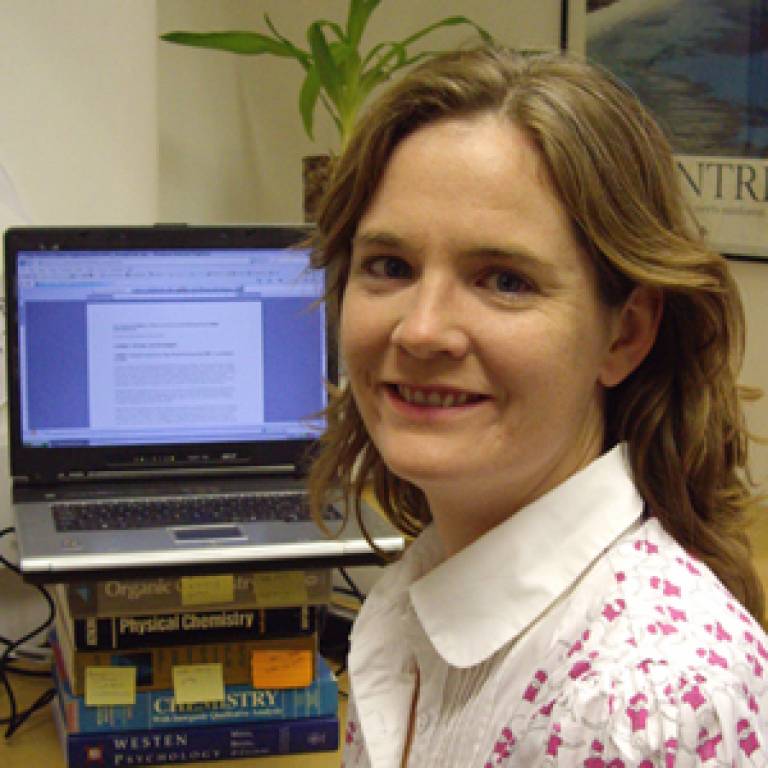Excellence in Teaching Award for UCL Engineering
14 December 2007
Links:
 ucl.ac.uk/research/personal?upi=SJBEL56" target="_self">Dr Sarah Bell
ucl.ac.uk/research/personal?upi=SJBEL56" target="_self">Dr Sarah Bell
Dr Sarah Bell, UCL Civil, Environmental & Geomatic Engineering, received an award from the Royal Academy of Engineering on 11 December for the excellence of her teaching, in particular her creation of a masters degree prioritising sustainability issues and industry collaboration.
The inaugural awards, sponsored by petrochemicals company ExxonMobil, seek to recognise lecturers who have distinguished themselves within their peer group in a number of ways, including demonstrating commitment to teaching, promoting engineering as a rewarding and creative career and establishing industrial and academic links.
On receiving the award, Dr Bell said: "Excellent teaching is the result of strong team work, including administrative staff, academics, external partners and students. This award recognises a culture of teaching excellence in my Department. I have been inspired and supported by many dedicated teachers and bright students here at UCL.
"New models of engineering teaching and practice are required to help society move towards ecological sustainability. It is an honour to be recognised by the Royal Academy of Engineering for taking the risks of moving beyond the traditional boundaries of engineering in my career. In receiving this award I feel optimistic about the future of a more socially engaged and ecologically sensitive engineering profession."
Dr Bell has lectured at UCL since 2005. Those two years have been marked by a range of teaching and research designed to foster awareness of sustainability issues and to build bridges between academia and engineering.
For example, she has introduced into undergraduate teaching a study of Sir Joseph Bazalgette's intercepting sewer system constructed in the 19th century, taking into account the social and political context in which it came about, and considering of its legacy for modern London. She also designed and leads a walking tour of London for first years, for which she co-wrote a guide that points out key engineering landmarks and aims to instil a sense of the importance of engineering in the life of a city.
Dr Bell is currently leading one multi-university project and is co-investigator on another, which look into emerging sustainability and critical infrastructures. In her capacity as co-director of the UCL Environmental Institute, she heads up a network of water researchers across UCL, academia and industry.
However, it is her work setting up the MSc in Environmental Systems Engineering, offered for the first time in 2007/2007, that she rates as her most notable teaching achievement to date. The degree is specifically designed to maximise involvement with third parties, combining systems engineering, environmental engineering and social sciences to provide students with the technical and management skills needed to solve complex environmental problems.
Thames Water, World Wildlife Fund, Tribewanted and Action Sustainability are among these third parties, which range from well established corporations and charities to start-companies working in engineering consultancy, property development, waste management, utilities and tourism. The partners enhance the course in a variety of ways, such as delivering guest lectures, sponsoring students and supervising student projects.
Faisal Qayium, now a 'green IT' programme manager at environmental charity Global Action Plan, was one of the students on the MSc last year. He said: "I'm delighted Dr Bell has won this award. She was a really excellent teacher, particularly in the way she made us think about bringing environmental concerns into our engineering and how engineering can be a force for social inclusion. Dr Bell was the coordinator of the project work I undertook in January last year, and she helped me in a really practical way, helping shape the form of the project and providing workshops to teach project management and team building skills, which have already been useful in a number of instances in my career."
Dr Bell received a Gold Medal for her achievements. Her win has brought UCL Civil, Environmental & Geomatic Engineering a package of benefits worth £50,000, including a cheque for £10,000.
To find out more about Dr Bell's teaching or the MSc in Environmental Systems Engineering, follow the links at the top of this article.
UCL context
UCL is committed to innovation in teaching as well as research. Groundbreaking teaching initiatives are in place across a range of departments and disciplines, inspiring students and academics alike to look at their subject from new perspectives.
Recent stories
UCL Bookshelf: 'An Element of Controversy'
Writers in residence: A novel role
An object lesson in enhancing life and learning
 Close
Close

